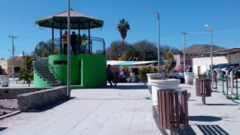During his inaugural Mass, Pope Leo XIV called for a renewed mission to aid the disenfranchised and heal societal wounds while expressing a firm stance against the wealthy elite's influence in the Church.
Pope Leo XIV's Inaugural Mass: A Mission to Elevate Ordinary Souls Amidst Societal Wounds

Pope Leo XIV's Inaugural Mass: A Mission to Elevate Ordinary Souls Amidst Societal Wounds
In his first Mass, Pope Leo XIV emphasizes the importance of addressing societal issues and stands committed to uplifting the marginalized as he embarks on his papacy.
In an emotionally charged ceremony held at the Sistine Chapel, newly elected Pope Leo XIV, born Robert Francis Prevost in Chicago, delivered his first Mass as the leader of the Roman Catholic Church, asserting his commitment to advocating for the marginalized. The pontiff emphasized the need for “missionary outreach” to assist in healing the numerous societal wounds afflicting communities globally.
In his homily, the American pope positioned his mission on the side of “ordinary people,” directly addressing the cardinals gathered, some of whom had previously been contenders for the papacy. He expressed concern that a waning faith had led to serious violations of human dignity across the globe. Leo's call to action resonated with the legacy of his predecessor, Pope Francis, while stressing that he would look to elevate those often ignored, reiterating the significance of being a humble servant in the Church rather than a figure of authority.
Pope Leo XIV, who served in Peru before his appointment as cardinal by Pope Francis in 2023, evoked the teachings of Jesus, highlighting that even his followers abandoned him in difficult times. He stated, “In our modern context, Christianity is often perceived as absurd and trivial,” calling for a revitalization of faith in spaces that marginalize believers.
The new pope, now officially leading approximately 1.4 billion Catholics, faces urgent challenges within a sharply divided Church, scrutinized for its stance on various issues such as LGBTQ inclusion, the role of women, and clerical celibacy. Some experts suggest Leo’s alignment with a “synodal church” model could open dialogue within these contentious areas, although concerns remain about whether substantive changes will occur under his leadership.
As the faithful from Chicago and Peru celebrated his ascendency, the broader implications of Leo XIV's papacy ignite anticipation for how he will navigate the Church's future direction. His commitment to “carrying the cross” and demanding action from the clergy offers hope for a renaissance of missionary work aimed at fostering community, mercy, and profound faith in the modern era.
In his homily, the American pope positioned his mission on the side of “ordinary people,” directly addressing the cardinals gathered, some of whom had previously been contenders for the papacy. He expressed concern that a waning faith had led to serious violations of human dignity across the globe. Leo's call to action resonated with the legacy of his predecessor, Pope Francis, while stressing that he would look to elevate those often ignored, reiterating the significance of being a humble servant in the Church rather than a figure of authority.
Pope Leo XIV, who served in Peru before his appointment as cardinal by Pope Francis in 2023, evoked the teachings of Jesus, highlighting that even his followers abandoned him in difficult times. He stated, “In our modern context, Christianity is often perceived as absurd and trivial,” calling for a revitalization of faith in spaces that marginalize believers.
The new pope, now officially leading approximately 1.4 billion Catholics, faces urgent challenges within a sharply divided Church, scrutinized for its stance on various issues such as LGBTQ inclusion, the role of women, and clerical celibacy. Some experts suggest Leo’s alignment with a “synodal church” model could open dialogue within these contentious areas, although concerns remain about whether substantive changes will occur under his leadership.
As the faithful from Chicago and Peru celebrated his ascendency, the broader implications of Leo XIV's papacy ignite anticipation for how he will navigate the Church's future direction. His commitment to “carrying the cross” and demanding action from the clergy offers hope for a renaissance of missionary work aimed at fostering community, mercy, and profound faith in the modern era.




















